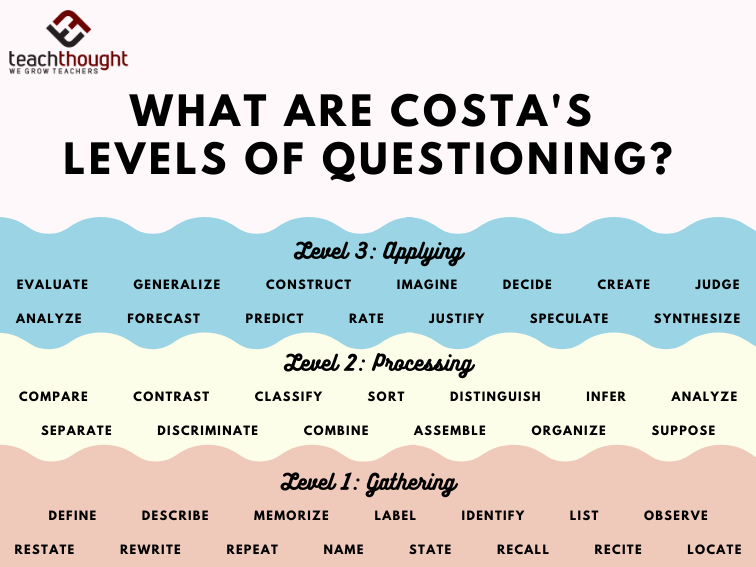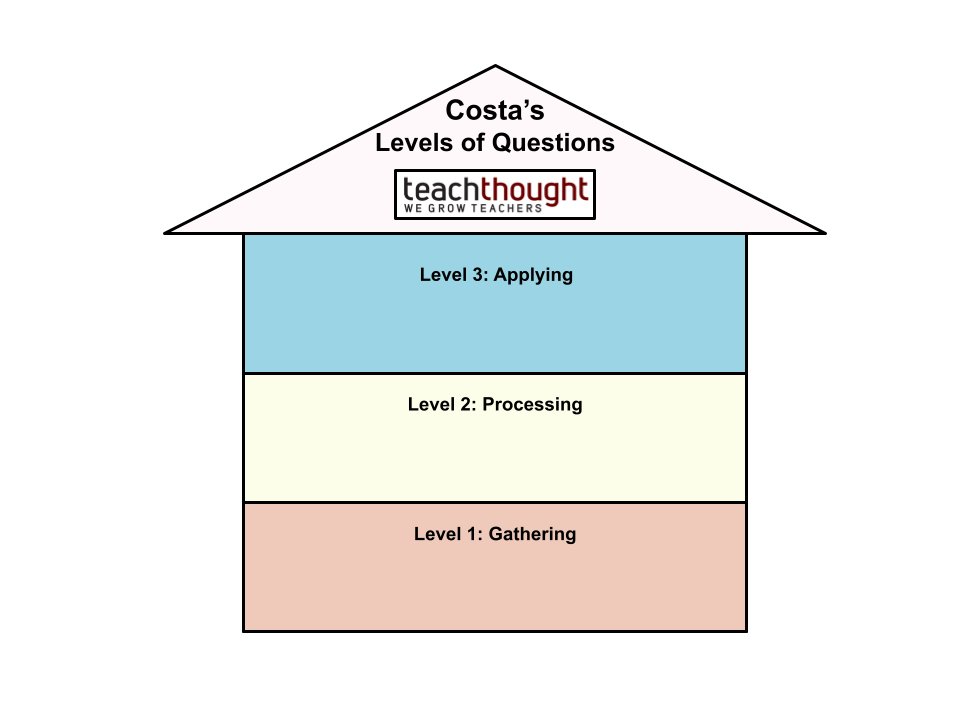

Costa’s Levels of Questioning– designed by educational researcher Art Costa– include 3 rates of examining designed to promote higher-level thinking and query.
Comparable to Flower’s taxonomy , Costa’s lower degree prompts students to utilize more fundamental professors; as students move up in degrees, the inquiries trigger them to make use of even more intricate thinking skills. Via decades of research on human durability, Dr. Costa also recognized the 16 Habits of Mind , a collection of actions that support students in navigating the difficulties that typically happen in institution and life, as a whole. Numerous of Dr. Costa’s 16 practices– believing interdependently, innovating, gathering information, and using previous knowledge to new circumstances– both need and enhance greater levels of questioning.
There is a substantive amount of study that sustains Dr. Costa’s schema. Newmann (1993 discovered that higher-order believing compels trainees to “manipulate info and ideas in manner ins which change their meaning,” and “anticipates trainees to fix troubles and develop indicating for themselves,” which aligns with a constructivist sight of education and learning
Costa’s Levels of Questioning are normally highlighted making use of the metaphor of a house with 3 floors:


Level 1: Gathering
Level 1 concerns mainly require students to deal with information ‘on the page.’ Answers to degree 1 questions are normally actual; significance, a trainee can actually point to the solution on a web page.
We’ve previously blogged about Flower’s Taxonomy power verbs , so you can anticipate that Costa’s levels have their very own collection of power verbs, also. Below are a couple of that you could find at the beginning of Level 1 inquiries:
- Specify
- Describe
- Memorize
- Tag
- Recognize
- Checklist
- Observe
- Restate
- Reword
- Repeat
- Name
- State
- Remember
- State
- Locate
- Select
- Suit
- Show
Degree 1 questions by content location could look like these instances:
- Scientific research : Tag the components of an animal cell.
- Mathematics : State the formula for finding the quantity of a cylinder.
- History : Suit the name of the majesty to their corresponding country.
- English Language Arts : Situate the area in the story where the climax takes place.
You can see how most of these Degree 1 power verbs need pupils to remember information, which is a vital skill in its own right. However, educators must strive for the majority of their questions to fall in Level 2 or 3, which test pupils to utilize higher-order thinking abilities.
Degree 2: Processing
Degree 2 questions go a step better than Degree 1, motivating pupils to refine details by ‘analysis in between the lines.’ While pupils may require to use actual information to develop their actions, Level 2 requires them to process that info with what they currently know in order to make new connections.
Right here are some instances of Degree 2 power verbs:
- Contrast
- Contrast
- Classify
- Kind
- Distinguish
- Infer
- Examine
- Separate
- Discriminate
- Combine
- Put together
- Organize
- Expect
Degree 2 inquiries by material location may turn up in the following methods:
- Science : Contrast the processes of mitosis and meiosis.
- Mathematics : Classify the geometric shapes according to their variety of sides and angles.
- History : Put together the following historic events in the order of importance, from many to the very least.
- English Language Arts : Analy ze the impact that the writer’s tone has on the total definition of the message.
Can you see exactly how Level 2 questions go a step even more than Level 1 More than merely regurgitating information, students take it and ‘do something’ with it. They categorize, make differences, and compare/contrast it against another component to see just how it influences the entire. These kinds of abilities can stimulate curiosity and construct a bridge to the questions that actually create creative thinking and higher-level reasoning.
Degree 3: Using
While Level 1 concerns prompt students to work with input, and Degree 2 concerns challenge them to process that input in order to make new connections. Right here, students participate in the highest-level thinking abilities to create an outcome. This can arise from making examinations and evaluations, screening remedies to numerous issues, or making forecasts.
We’ve included some examples of Degree 3 power verbs below:
- Examine
- Generalise
- Construct
- Think of
- Decide
- Create
- Judge
- Assess
- Projection
- If/then
- Anticipate
- Price
- Justify
- Speculate
- Synthesize
- Develop
- Assume
Degree 3 questions by material location might resemble the following:
- Science : Based on data from the last years of storm task in the southeast united state, forecast just how the regularity of typhoon task will certainly alter in the next ten years.
- Mathematics : Rate the likelihood of a governmental candidate winning the political election based on securing the selecting votes from the complying with U.S. states: Florida, California, Virginia, New York, Illinois.
- History : Produce a social compact that thinks about the results of globalization and technical advancement in the 21 st century.
- English Language Arts : Develop an argument that defends or refutes necessary worker inoculation plans in the United States.
Whether planning for discussion-based tasks, project-based discovering, or independent inquiry, instructors must make every effort to orient most of student reasoning and engagement at Levels 2 and 3 Assessments that trigger pupils to recall standard truths (such as the date of a historical occasion, or the name of a writer, or the formula for an equation) don’t actually analyze trainees’ capability to use brand-new skills or information to new contexts. A Level 2 or 3 concern would certainly test pupils to make links with standard information. For example, instead of recalling a simple day, an extra open-ended inquiry would ask trainees to anticipate, based upon the time in background that a specific event happened, the possibility of it persisting, provided a similar sociopolitical environment. Along the exact same lines, as opposed to recalling the names of well-known authors, a teacher may test students to make an argument for exactly how an author would certainly cover a certain modern-day concern.
In “A Talk with Educators,” James Baldwin explained the paradox of education: “As one starts to come to be conscious, one begins to examine the society in which [they] are informed.” Degree 2 (and mainly, level 3 concerns intend to promote this sort of response in trainees, to create them to tilt their heads, do double-takes, explain disparities, disrupt the status, identify defects in current establishments, and develop cutting-edge remedies for those flaws. These are the inquiries that inspire us to come up with even more questions, to consider our thinking, and to evolve– both as people and societies.